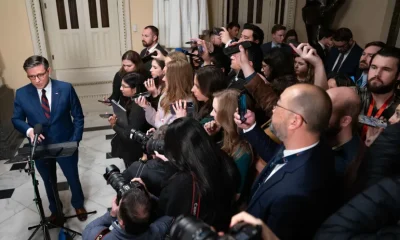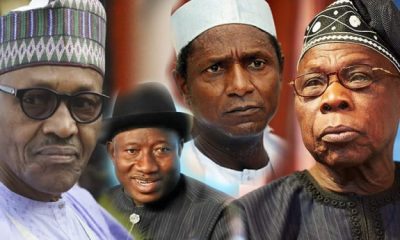News
NASU Threatens Indefinite Strike Over Unpaid Salaries

-
NASU Threatens To Embark On Indefinite Strike Over Unpaid salaries.
-
Despite President Tinubu’s order to pay four months’ salaries, only teaching staff received compensation, leading to mounting grievances among non-teaching staff.
-
The House of Representatives has intervened, but the issue remains unresolved, raising concerns about the impact on tertiary education in Nigeria.
EKO HOT BLOG reports that Non-teaching staff in Nigeria’s public universities are on the verge of an indefinite industrial action due to unpaid salaries, further exacerbating challenges in the educational sector.
The aggrieved groups, including the Senior Staff Association of Nigerian Universities (SSANU), the National Association of Academic Technologists (NAAT), and the Non-Academic Staff Union of Education and Allied Institutions (NASU), are protesting the non-payment of salaries withheld during their 2022 strike action.
The dispute revolves around the non-disbursement of five and a half months’ salaries under the former administration of President Muhammadu Buhari.
Despite President Bola Tinubu’s directive in October to pay four months’ worth of salaries, only teaching staff received their payments in February, leaving non-teaching staff uncompensated.
EDITOR’S PICKS
- BREAKING: FG Declares Friday, Monday
- Why Abuja Will Experience ‘Partial’ Blackout – AEDC Public Holidays For Easter
- [JUST IN] Decades Of Darkness: Port Harcourt Airport Communities Protest Neglect, Disrupt Flight Services
The situation led to a warning strike by the non-teaching staff two weeks ago, aiming to pressure the government into fulfilling their payment demands.
According to the National President of NAAT, Comrade Ibeji Nwokoma, the House of Representatives has intervened in the matter, signalling political attention to the ongoing financial dispute.
He said, “We were invited last Wednesday by the House of Representatives Committee on Tertiary Education, representatives of the National Universities Commission NUC, the Committee of Vice Chancellors and others were there. Before our three-day warning strike, members gave the mandate that we should go on full blown strike.
“However, the committee pleaded with us that we should hold on. That they are now on recess and could do little. They pleaded that we give them the opportunity to reconvene after the recess and they would wade into the matter fully. In view of this, we want to give them the benefit of doubt and see what we happen between now and the end of April.”
The National President of SSANU, Mohammed Ibrahim, said, “Our members went on strike in March 2022 and it was over the refusal of the government to fulfill the 2009 Agreement we had with the government. The agreement was to be renegotiated every three years but that was not done. Over 15 years now, what we have been having is taking a step forward and taking two backwards. Government keeps tossing us from one committee to another.
“They are owing us five and a half months from that strike action, but they paid teaching staff four months withheld salaries and forgot others. The same attitude is what obtains when you have Earned Allowance to be paid. Some people would just arrogate to themselves the power to take whatever they like from the money and leave the crumbs for others.
”Those who set up the university system knew the importance of all workers, whether teaching or non-teaching, if not, a single person would have been saddled with responsibility of being the teacher, driver, technologist, accountant and so on.”

NASU Threatens Indefinite Strike
Speaking in the same vein, Comrade Ibrahim of SSANU, wondered why non-teaching staff are seen as not important in the system.
He said, “We were at a meeting late last year after the pronouncement by President Bola Tinubu that four months salaries would be paid and the Minister of Education was there and he gave the assurance that all would benefit, now the reverse is the case. We are not a strike happy union but we are being pushed to the wall. Between 2022 and now, we have lost over 100 members due to their inability to take care of themselves because of lack of fund.
“When they paid the teaching staff four months salaries, we wrote a protest letter to the government and the receipt of it was acknowledged, but could you believe it that this is the fifth week, we have not heard anything from the government.”
On what the unions would do after the suspension of the warning strike and the government not doing the needful, Ibrahim said the necessary organs would meet and the decision would be made public as soon as possible.
He said, “We have our own organs and the government have theirs. So, if our organs call for total and indefinite strike, which is one of the tools we use, the system would be shut down totally. Non-teaching staff are the ones in charge of power and water supply. They man security posts, if they all abandon such duties, let us see what would happen.”
FURTHER READING
- BREAKING: Notorious Bandits’ Leader, Dogo Gide Is Dead
- Oil Marketers Deny Petrol Price Drop Amidst Market Stability
- Play Your Part, Prayers Will Not Fix Nigeria – Presidency
Asked what would be the solution to the challenges facing tertiary institutions in the country, Ibrahim said government should just adequately fund the sector.
He said, “When education is funded adequately, the government would spend less on security, health and many vices would be reduced.”
Click to watch our video of the week
Advertise or Publish a Story on EkoHot Blog:
Kindly contact us at [email protected]. Breaking stories should be sent to the above email and substantiated with pictorial evidence.
Citizen journalists will receive a token as data incentive.
Call or Whatsapp: 0803 561 7233, 0703 414 5611

















